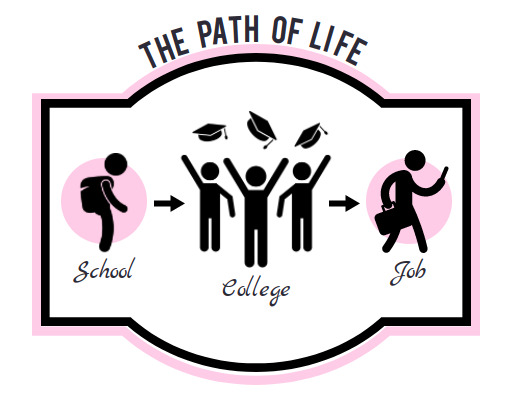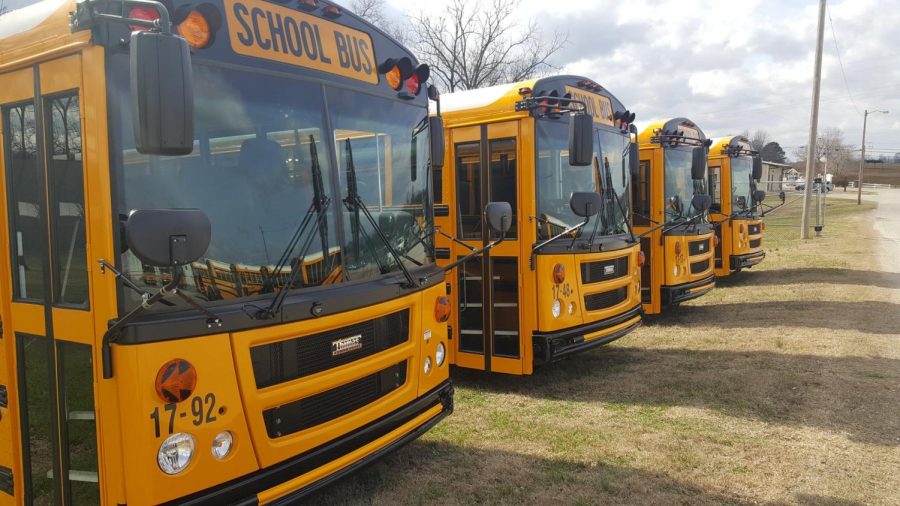College isn’t the only option: let’s acknowledge that

Graphic by Charlotte Alden.
November 15, 2017
You could call me school-obsessed and I wouldn’t argue. There’s something about tests and grades that makes me want to work hard. When I was little, I decided to make my education a priority, and I’ve never lost that mindset. But once I got to high school, my obsession became much more unhealthy.
As school got more difficult, I began living in a small world of homework, tests, and after-school activities, where everything beyond the classroom and my extracurriculars felt insignificant. I laid out a strict plan for myself: I would get good grades, go to college, then get a job. I forgot to think about anything else.
Then, over this past summer, I went to a summer camp in Washington state where the counselors were college age or older, and, being a junior in high school, my future came up frequently in conversation. Much to my surprise, many counselors told me nonchalantly that they hadn’t gone to college because it “wasn’t their vibe” or they “weren’t classroom learners.”
I was shocked. These people seemed so happy, yet they hadn’t accomplished what I had assumed was the end goal of all my hard work: college—a crucial link in the chain of my plan.
I found myself asking, is it possible to be happy without following the rigid educational path I had always planned on? Little by little, I began to question my school-obsessed brain.
The first thing I noticed was how unaware I was of the outside world. Most Whitman students have always known that they’re going to college. Their parents probably went to college, their neighbors probably went to college, their best friend wants to go to college, and they’ve always assumed they’re going to college too. According to the New York Times in 2014, only 65.9%, of students in the country graduate to attend college. At Whitman, it’s above 95%. This isn’t because we’re all innately smarter here. It’s because of the environment we foster.
This isn’t to say there’s anything wrong with going to college. The benefits of going to college—a good education, decent wages—are compelling. Yet, there’s an unhealthy pressure for students to follow this neat path. We need to keep in mind how many different opportunities there are to achieve your goals, whatever they might be.
Take, for instance, vocational programs. These teach a specific trade, like office management skills or medical assisting. Instead of college, students have the opportunity to specialize in one area. The classes are cheaper, too, providing a viable option in place of college. There are also other unconventional opportunities, like online school. We need to stop thinking that going to a 4-year college is the only way to succeed.
I started thinking a very radical thought—or, one that’s radical for me. Maybe I can be happy and successful without giving so much weight to school. Even if I don’t get straight A’s, I’ll still be fine. The path that I’m on is flexible. Getting derailed doesn’t mean I should give up; it just means I have to find a new path. I don’t need to go straight to college. Other opportunities are, as difficult as it seems to admit, still viable options.
It’s time to reevaluate the way we view college at Whitman. Once students forget the importance of flexibility, the path so many of us put ourselves becomes rigid and toxic. Feeling stuck can be an unnecessary cause of stress. In reality, there are so many unconventional ways to be successful. We have to learn how to be okay doing what’s right for us.








Kathy Gambrell • Nov 19, 2017 at 11:45 am
It is “medical assistING.” Medical assistance is a government program.